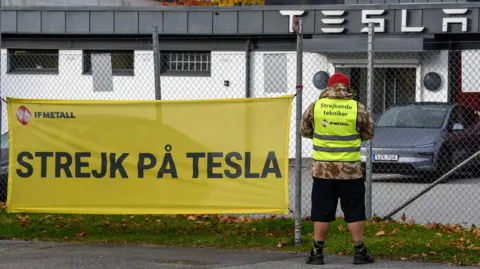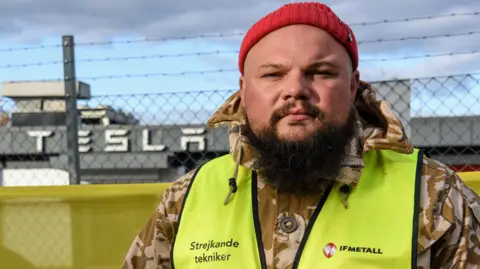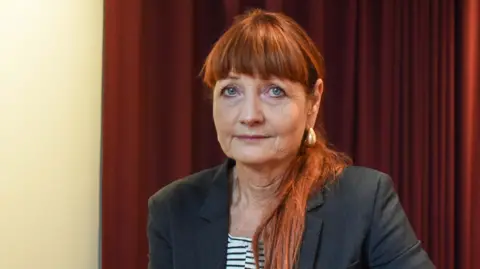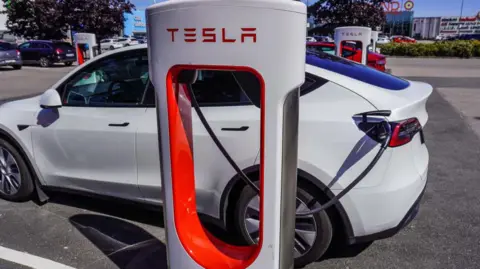Tim ManselBusiness reporter, Malmo, Sweden
 BBC
BBCIn Sweden, 70 auto mechanics continue to fight one of the richest companies in the world – Tesla. The strike at 10 Swedish service centers of the American automaker has reached its second anniversary, and there is little chance of resolution.
Janis Kuzma has been on the Tesla picket since October 2023.
“It’s a difficult time,” says the 39-year-old. And as cold winter weather hits Sweden, it's likely to get even harsher.
Janis spends every Monday with a colleague standing outside the Tesla garage in the industrial area of Malmö. His union, IF Metall, provides accommodation in the form of a mobile construction van, as well as coffee and sandwiches.
But across the street, where the workshop appears to be in full swing, everything is business as usual.
The strike concerns an issue that goes to the very heart of Swedish industrial culture – the right of trade unions to negotiate wages and conditions on behalf of their members. This concept of collective agreement has underpinned industrial relations in Sweden for almost a century.

Today, about 70% of Swedish workers are members of a trade union, and 90% are covered by a collective agreement. Strikes are rare in Sweden.
This agreement is welcomed by all. “We prefer the right to freely negotiate with unions and sign collective agreements,” says Matthias Dahl of the business organization the Confederation of Swedish Enterprise.
But Tesla upset the apple cart. Outspoken CEO Elon Musk has said he “disagrees” with the idea of unions. “I just don’t like anything that creates something like masters and peasants,” he told a New York audience in 2023. “I think the unions are trying to create negativity in the company.”
Tesla arrived in Sweden back in 2014, and IF Metall has long wanted to conclude a collective agreement with the company.
“But they didn’t respond,” says Marie Nilsson, the union’s president. “And we got the impression that they were trying to hide or not discuss it with us.”
According to her, the union ultimately saw no other option but to go on strike, which began on October 27, 2023. “Usually a threat is enough,” Ms. Nilsson says. “The company usually signs the agreement.”
But not in this case.

Janis Kuzma, originally from Latvia, started working at Tesla in 2021. He argues that pay and conditions were often subject to the whims of managers.
He recalls a performance review in which he says he was denied an annual salary increase because he was “not meeting Tesla's goals.” Meanwhile, a colleague was reportedly denied a pay rise because he had the “wrong attitude”.
However, not everyone went on strike. At the time of the strike, Tesla employed about 130 mechanics. IF Metall says about 70 of its members are on strike today.
Tesla has long since replaced them with new workers, something that has not had precedent since the 1930s.
“Tesla did it [found replacement staff] openly and systematically,” says Herman Bender, a researcher at Arena Idé, a think tank funded by Swedish trade unions.
“This is not illegal, and it is important to understand that. But this is contrary to all established norms. But Tesla doesn't care about regulations.
“They want to break norms. So if someone tells them, 'Hey, you're breaking the norm,' they take it as a compliment.”
The BBC asked to speak to Tesla subsidiary TM Sweden, but the request was rejected in an email citing “all-time high deliveries”.
Indeed, in the two years since the strike began, the company has given only one media interview.
In March 2024, “TM Sweden boss” Jens Stark told business newspaper Dagens Industri that the company would be better off not entering into a collective agreement, but instead “work closely with the team and give them the best possible conditions.”
Mr Stark denies the decision not to enter into a collective bargaining agreement was made at Tesla's US headquarters. “We have the authority to make those decisions ourselves,” he said.
IF Metall is not alone in its struggle. The strike was supported by a number of other trade unions.
Dockers in neighboring Denmark, Norway and Finland refuse to service Tesla; Tesla's Swedish facilities no longer collect trash; and newly built charging stations are not connected to the country's grid.
There is one such facility near Stockholm's Arlanda Airport, where 20 chargers sit idle. But Tibor Blomchel, president of the Tesla Club enthusiast group in Sweden, says Tesla owners have not been affected by the strike.
“There is another charging station 10 km (six miles) from here,” he says. “And we can still buy our cars, we can service our cars, we can charge our cars.”
 AFP via Getty Images
AFP via Getty ImagesWith the stakes high on both sides, it is difficult to see an end to the standoff. IF Metall risks setting a precedent if it accepts the principle of collective agreement.
“The concern is that this will spread,” Mr. Bender says, “and ultimately erode the strong support we have for the labor market model among employers as well.”
Tesla, on the other hand, may feel that losing this fight in Sweden will strengthen the hand of those who want to unionize Tesla at its manufacturing plants in the United States and Germany, where it employs tens of thousands of employees.
Mr. Bender sees another reason for Tesla's stance. “I think it's important to understand that Elon Musk doesn't want to be told how to do things,” he says.
“And I think he views the strike taken by the union not as an invitation to negotiate, but rather as an ultimatum to sign on a dotted line that he doesn't want to sign.”
Mr Blomhall of the Tesla Club in Sweden also says he doesn't see a quick fix. “It will be another Korean War,” he says. “A conflict that just drags on.”









